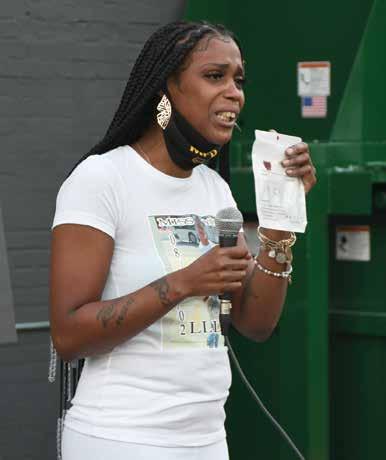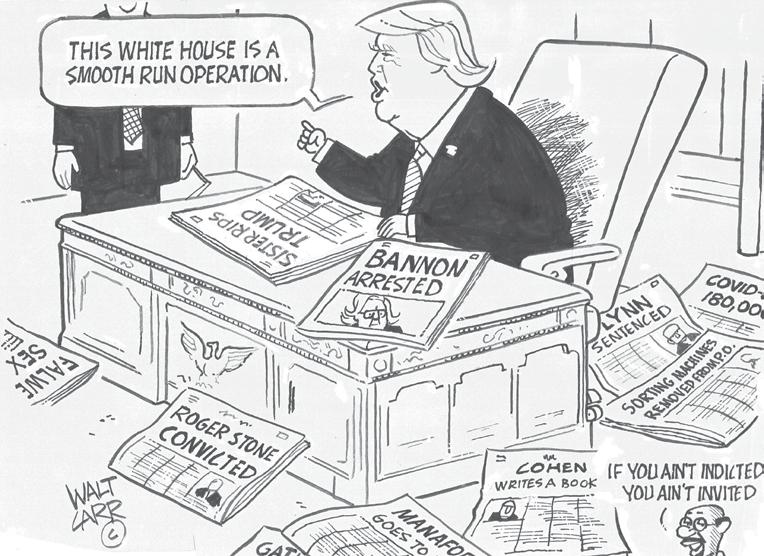OPINIONS/EDITORIALS
EDITORIAL If You Believe Black Lives Matter, Make Sure You’re Counted in Census 2020
The Labor Day weekend has come and gone and schools are back in session – the majority adopting a virtual learning model due to the continuing health pandemic. So, as you take a moment to exhale, we urge our readers to be sure that they’ve completed the Census 2020 questionnaire and returned it to the U.S. Census Bureau. In case you didn’t know, the deadline has been moved one month earlier to Sept. 30 – the last day on which residents in America can make a difference for their communities by participating in the census counting process. While it may take a little longer for the District to finally secure statehood status and its accompanying rights, it only takes a few minutes to complete the Census 2020 questionnaire, either by phone, mail or by employing the newest way to reply – online. And don’t forget to include all babies and young children on your form. Census results matter as they shape the future of communities across the nation. Census data informs how billions of dollars in federal funds will be distributed for health clinics, school lunch programs, disaster recovery initiatives and other critical programs and services for the next 10 years. One of the most memorable quotes from the iconic film, “Jerry Maguire,” “show me the money,” continues to resonate within American culture nearly 24 after the movie’s release. But if you fail to participate in the Census, your community could find its urgent pleas to “show me the money” falling on deaf ears. Communities that fail to fully participate risk missing out on billions of federal dollars – funds that are now more important than ever given COVID-19 and its unprecedented impact on our lives and livelihoods. D.C.’s response rate, 58.4 percent, ranks 34th among states and in the 51st percentile for cities, based on data released several weeks ago. But nearly a four-fold difference exists within different portions of the City – from the highest self-response rate at 86.6 percent in Ward 3’s American University Park neighborhood to 26 percent in the Barry Farm area in Southeast. Ironically, as most residents have been moved out of Barry Farm, the self-response rate cannot provide an accurate assessment of the mostly low- income and Black neighborhood. After all, the Census counts people, not empty chairs and vacated apartments. Still, most of Ward 8 and many neighborhoods in Ward 7 continue to lag far behind – in the bottom 20th percent of self-response in the nation. But there’s still time. Over the next few weeks, community activists promise to pound the streets in Southeast ensuring that every resident has been counted. Canvassers hired by the Census Bureau will still be knocking on doors. Perhaps in the wake of the death of George Floyd, among others, you’ve joined thousands of protesters, waving posters and shouting in unison, “Black lives matter.” You may even be among those who both in the past and in recent days, have been compelled to invoke that phrase from “Jerry Maguire” lore, “show me the money.” But if you’re really serious – if both phrases have become part of your DNA and philosophy of life – then you must complete the Census 2020 form. It’s just as important as casting your vote in November. Why? Because similar to why exercising one’s right to vote can have longtime ramifications on America in cities great and small, the impact of your participation in the Census 2020, or lack thereof, will be felt by U.S. communities – all neighborhoods – for years to come. WI
Remembering the Victims of 9/11 and the Vote This year marks the 19th anniversary of 9/11, remembered as the deadliest day in U.S. history. Four planes flown by terrorists slammed into the World Trade Center’s twin towers in New York and the Pentagon just outside of Washington, D.C. in Arlington, Va. and a fourth that crashed in a field in Shanksville, Pa. Hundreds of people were killed instantly, including men, women, and children of every race and ethnic group. Hundreds of others died trying to escape the flames and collapse of the 110-story New York skyscraper hit by a plane on the 80th floor, and moments later, a plane sliced through the 60th floor of its twin tower. The attacks were captured on television broadcasts raising shock and fear across the country and the world. Among those who survived, thousands still suffer from grave illnesses, including cancers of all sorts. Many continue to seek compensation for their life-threatening conditions, including the first responders and their
TO THE EDITOR Rest in Power
Trending Upward
What a wonderfully penned tribute to the great Chadwick Boseman by D. Kevin McNeir. I personally get triggered seeing the constant “dead at 43,” so I’m grateful that you took a different approach to the horrid news of such an icon. We appreciate you.
Happy to read about the HIV rates declining in the District. For a long time, D.C. had such an ugly stigma attached to HIV. The stigma had a major impact on residents and even more so those living with the virus. Prevention campaigns and programming need to continue. It’s working!
Fatima Reynolds Washington, D.C.
survivors. Others are still grieving the loss of loved ones, and their wounds reopen on the anniversary of the attack. On this day, we join those who remember the six D.C. Public Schools teachers and students who were killed on the plane that crashed into the Pentagon. They were en route to California to study ecology by invitation of the National Geographic Society. We take this moment to say their names: Asia Cottom, Bernard Brown and Rodney Dickens, along with their teachers Hilda Taylor, James Debeuneure and Sarah Clark, from Leckie and Ketchum Elementary Schools and Backus Middle School. Nearly 20 years later, Americans ask if we are saf-
WWW.WASHINGTONINFORMER.COM / THE WASHINGTON INFORMER
Beatrice Smalls Laurel, Md.
er today. The Obama Administration abandoned the color-coded warning system, leaving most Americans with no idea of our daily susceptibility to an attack. And, what are the current warning systems? The increasing incidents of internal terrorist attacks lay bare the fact that we are not safer. And this president makes us feel less safe with acts and statements that stoke the fires of conflict domestically and across the globe. As we reflect on 9/11, it’s also a time to remember why it’s important to vote on Nov. 3. The security of this country also rests in the hands of its voters. WI
SEPTEMBER 10 - 16, 2020 29









